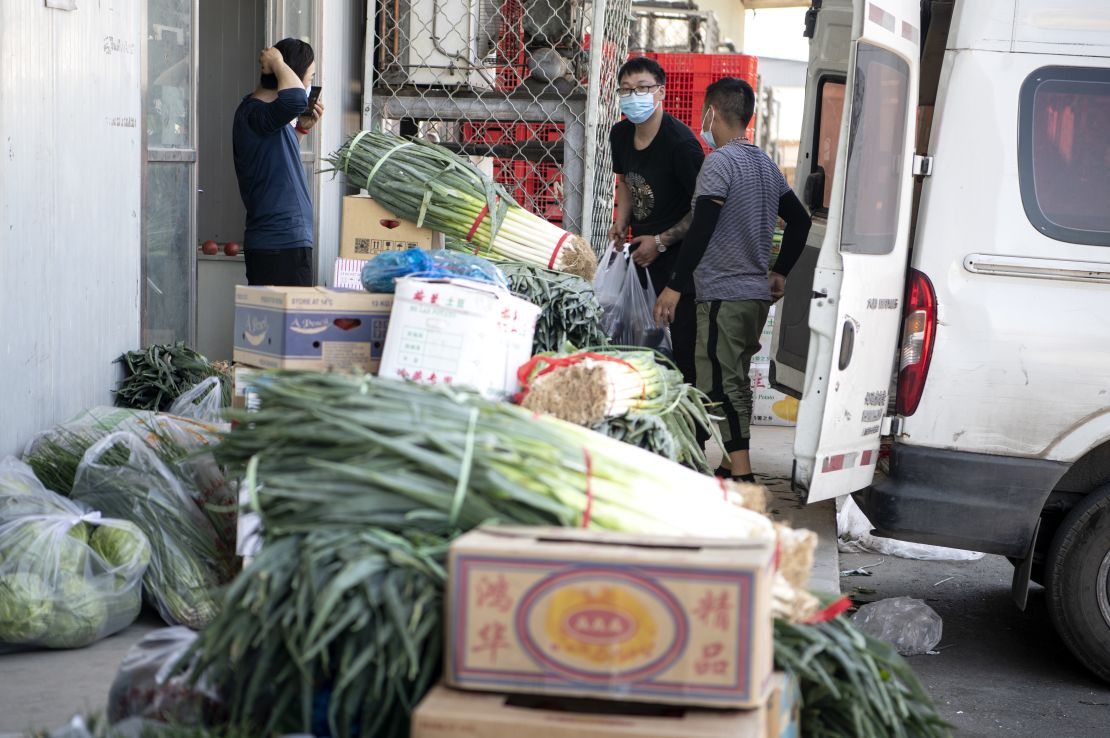Authorities in Beijing have imposed a soft lockdown on the entire city, after the Chinese capital reported more than 100 new locally transmitted coronavirus cases in the past five days.
The city raised its alert level from Level 3 to Level 2 – the highest alert being Level 1 – the Beijing government’s Deputy Secretary Chen Bei announced in a press conference Tuesday night.
The move comes as the city’s latest coronavirus outbreak continued to spread Tuesday, with at least 106 new infections since Thursday following an outbreak at Xinfadi, the city’s largest wholesale food market.
Officials had earlier locked down more residential compounds, ordered more than 30,000 restaurants to be disinfected and tightened outbound travel.
All residents living communities deemed medium or high risk, as well as people connected to the Xinfadi market, are banned from leaving the city.
The sprawling, bustling market in Beijing’s southwestern Fengtai district occupies 277 acres and has more than 2,000 stalls, selling mainly fruit and vegetables as well as meat and seafood. It supplies about 70% of the city’s vegetables and 10% of its pork, according to officials.
The market has been shut down since Saturday, but its sheer size and the amount of people who work or visit there from in and outside of Beijing have heightened the risk of the outbreak spreading.

For the rest of the city’s more than 20 million residents, non-essential travel out of town is strongly discouraged, according to the government announcement. Those who must travel need to present a negative result from tests conducted within seven days of departure.
The city is reintroducing strict access rules in and out of all local residential communities, and shutting down all schools and recreational venues. Sporting events will also be canceled.
Via door-to-door visits and calls, authorities have tracked down nearly 200,000 people who had been to the market during the two weeks prior to its closure. They have been told to stay at home for medical observation and are being tested for the coronavirus, a city official told a news conference on Monday.
Residential lockdown
Two other Beijing food markets have been shut down due to confirmed cases linked to Xinfadi, leading to strict residential lockdowns in their vicinity.
On Tuesday, Xicheng district – which neighbors Fengtai – announced that seven residential communities around the Tiantao Honglian market will be locked down following the discovery of a coronavirus case on Sunday.
This follows similar lockdowns on residential compounds near Xinfadi and the Yuquandong market in Haidian district. In total, 29 residential communities have been locked down across the city.
The residential lockdown measures are similar to the ones imposed earlier in the city of Wuhan, the original epicenter of the coronavirus outbreak.
Wang Du, who lives in one of the communities under lockdown near Yuquandong market, said residents couldn’t leave the compound to buy groceries, and had to order food online or buy from a truck that came to the compound once a day with potatoes, fresh vegetables and eggs.
She said all residents in her community had nucleic acid tests for the coronavirus yesterday.
“To be honest, I’m not too worried,” she said. “I think we have a lot of experience in containment measures, and we’re able to react very swiftly (to the new outbreak).”
As of Tuesday morning, 276 agricultural produce markets and 33,173 restaurants across the city had also been disinfected, officials said.
Outbound travel restricted
The outbreak has also spread beyond Beijing, with the nearby provinces of Liaoning and Hubei reporting a total of eight coronavirus cases linked to the capital clusters.
On Tuesday, Sichuan province in the country’s southwest also reported a confirmed case – a woman who returned from Beijing on June 9. She was infected while visiting her husband, who worked at Xinfadi market.
Unlike Wuhan, the epicenter of China’s original outbreak, Beijing has not completely cut off travel. However outbound taxi and car-hailing services, and some long-distance bus routes between Beijing and neighboring provinces have been suspended, according to the state-run Beijing Daily.
Municipal authorities also banned high-risk groups, such as close contacts of confirmed cases, from leaving the city, officials said Monday.
On Tuesday, Shanghai announced that travelers from areas with medium-to-high coronavirus risk would be required to be quarantined for 14 days. Beijing had one neighborhood designated as high-risk and 22 as medium-risk as of Monday.
CNN’s Steven Jiang, Shawn Deng, Philip Wang and Ivan Watson contributed to reporting.





















